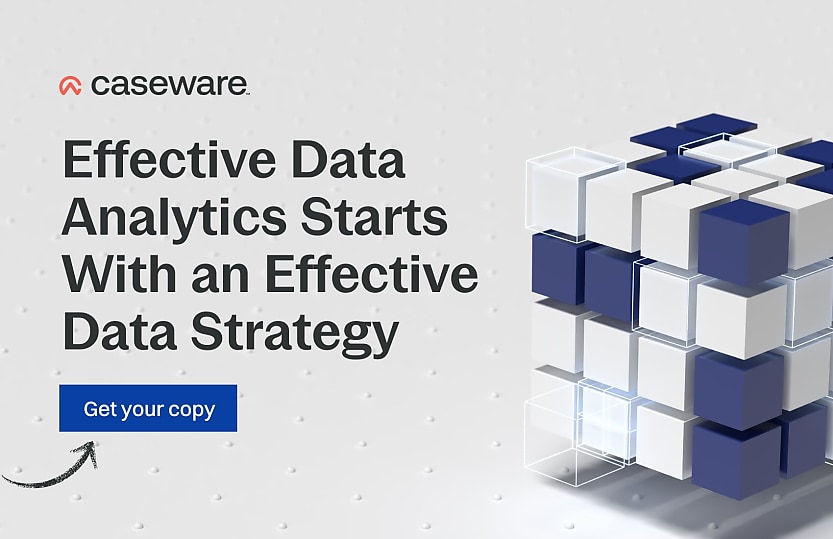Effective Data Analytics Starts With an Effective Data Strategy

Are you considering adopting analytics to enhance the efficiency and effectiveness of your accounting practice? The good news is that you don't have to make an immediate all-in investment.
The first step is understanding how to transition from your current state to a point where you can effectively leverage an analytics solution to provide deeper insights to your clients. From there, gradually take the approach to make sure you get the maximum benefit from your analytics package.
Developing an effective data strategy can help you achieve your business objectives, such as boosting client retention or improving decision-making. Let's take a closer look at how to develop such a strategy.
Find the right talent
To ensure a smooth implementation of an analytics solution, it's important to identify a team member who will lead the project and act as a champion. This person should be an executive team member or a senior manager who can generate support and enthusiasm for the project. Additionally, it's important to identify all key stakeholders, including departments and employees, who will be impacted by the analytics solution and keep them informed of any developments. By doing this, you can minimise any opposition and ensure that the project proceeds smoothly.
A good data strategy should also identify:
- technology requirements
- how data will be gathered
- how the data will be used to generate insights
- which employees will create and share the data
- how the data will be shared within your organisation and externally
- the steps and timelines related to implementing the data strategy
Building out a solid data strategy takes time, but it will ensure you get the most value from your
investment.
Quality data is key to analytics success
Data capture will be an important factor for many organisations. Data extracted from ERP solutions, financial accounting systems, and other sources may not be ready for analysis immediately. It’s important to ensure that collected data isn’t corrupt, incomplete or inaccurate.
Accounting and IT teams should work together to understand the data an organisation is collecting and evaluate its quality before it undergoes analysis.
Insights derived from incomplete or incorrect data can lead to faulty conclusions, so data quality needs to be a priority. You should start by cleaning up the most important data to achieve your organisation’s business goals and then adding other data sets over time.
If your organisation is deploying analytics for the first time, it will need to invest in specialised staff and/or training for existing accountants and auditors, depending on their role. Businesses will need to know how to source the data they require — whether internally or from external clients — and how to perform accurate data analysis. Staff will also need to know how to use the insights gained from analytics to perform better decision-making.
Once your organisation has gained experience in analytics, in-house analytics experts can train other staff. Employees should also be encouraged to continue upgrading their analytics skills, stay on top of trends and look for new learning opportunities.
Getting started with analytics
As with any new technology project, starting small is typically best, even if your organisation has big analytics dreams. Your project lead should have a good understanding of what data sources are available and how applying analytics will be beneficial to each data set. Picking a process with a lot of manual work, such as journal testing, is an ideal starting point because it’s easier to show a good return on investment and highlight the benefits analytics delivers.
Once your organisation has completed its first analytics project, it should evaluate the results to determine how effective the solution was. Did it deliver accurate results? Did it save time? Are there areas for improvement? If staff determine the project was a success, they can add analytics to other processes and consider automating some procedures.
Having some training is important to the success of any analytics project. If accounting and audit staff haven't already, they should take some basic analytics courses. Courses are available from a wide range of Australian institutions and accounting organisations, such as the Institute of Internal Auditors and the Auditing and Assurance Standards Board.
Staff should be trained on the basics of how to use analytics in accounting and auditing, as well as receiving instruction on the specific analytics tools they will be using. For instance, Caseware and its partners offer training on its Caseware IDEA analytics platform for both new and experienced users.
A new era in accounting and audit
The accounting and auditing industries are transforming. Manual processes and spreadsheets cannot take advantage of all the valuable data that is now available. To deliver better forecasts, conduct more thorough audits, and provide meaningful advice to clients and senior executives, accountants and auditors need to turn to analytics solutions capable of examining data in real-time.
Having access to real-time information allows you to provide a complete, up-to-date picture of an organisation’s financial health. If an anomaly is detected, it can be flagged for resolution immediately. Real-time information also allows you to offer more insightful advice to clients and executives, boosting client loyalty and raising your department’s profile.
Switching from spreadsheets and manual processes to analytics solutions and automated artificial intelligence-based scripts won’t happen overnight. It requires an investment in time and resources to build a thorough data plan, train staff in analytics and implement and test the analytics systems. The payoff can be enormous, giving accounting firms an advantage over their competitors and transforming corporate accounting teams into trusted advisors.
Discover how analytics can help transform you into a trusted advisor to your clients by downloading your copy of the whitepaper, Your Guide to Using Analytics Software in Audit and Accounting.